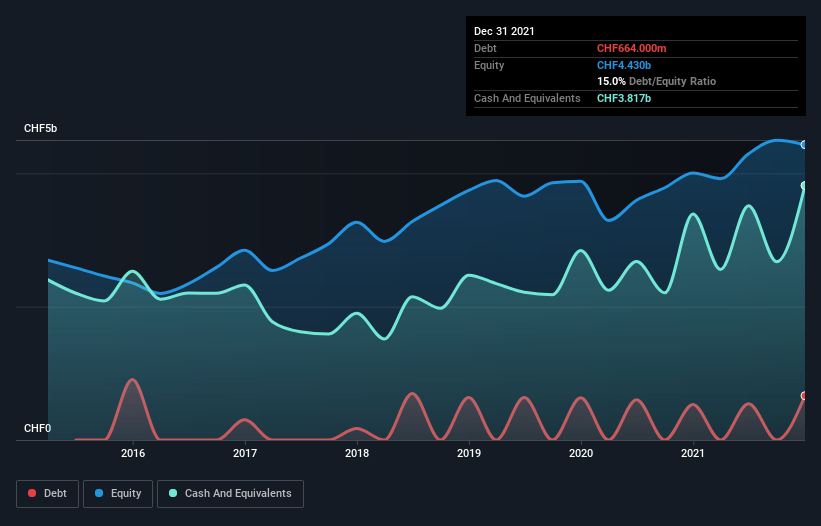
The external fund manager backed by Berkshire Hathaway's Charlie Munger, Li Lu, makes no bones about it when he says 'The biggest investment risk is not the volatility of prices, but whether you will suffer a permanent loss of capital.' It's only natural to consider a company's balance sheet when you examine how risky it is, since debt is often involved when a business collapses. We note that Schindler Holding AG (VTX:SCHN) does have debt on its balance sheet. But is this debt a concern to shareholders?
When Is Debt A Problem?
Debt is a tool to help businesses grow, but if a business is incapable of paying off its lenders, then it exists at their mercy. In the worst case scenario, a company can go bankrupt if it cannot pay its creditors. However, a more usual (but still expensive) situation is where a company must dilute shareholders at a cheap share price simply to get debt under control. Of course, plenty of companies use debt to fund growth, without any negative consequences. The first step when considering a company's debt levels is to consider its cash and debt together.
View our latest analysis for Schindler Holding
What Is Schindler Holding's Debt?
The image below, which you can click on for greater detail, shows that at December 2021 Schindler Holding had debt of CHF664.0m, up from CHF532.0m in one year. However, its balance sheet shows it holds CHF3.82b in cash, so it actually has CHF3.15b net cash.

How Healthy Is Schindler Holding's Balance Sheet?
Zooming in on the latest balance sheet data, we can see that Schindler Holding had liabilities of CHF5.96b due within 12 months and liabilities of CHF1.59b due beyond that. Offsetting this, it had CHF3.82b in cash and CHF3.17b in receivables that were due within 12 months. So its liabilities outweigh the sum of its cash and (near-term) receivables by CHF561.0m.
Of course, Schindler Holding has a titanic market capitalization of CHF22.2b, so these liabilities are probably manageable. But there are sufficient liabilities that we would certainly recommend shareholders continue to monitor the balance sheet, going forward. Despite its noteworthy liabilities, Schindler Holding boasts net cash, so it's fair to say it does not have a heavy debt load!
Fortunately, Schindler Holding grew its EBIT by 9.6% in the last year, making that debt load look even more manageable. When analysing debt levels, the balance sheet is the obvious place to start. But ultimately the future profitability of the business will decide if Schindler Holding can strengthen its balance sheet over time. So if you're focused on the future you can check out this free report showing analyst profit forecasts.
Finally, a business needs free cash flow to pay off debt; accounting profits just don't cut it. Schindler Holding may have net cash on the balance sheet, but it is still interesting to look at how well the business converts its earnings before interest and tax (EBIT) to free cash flow, because that will influence both its need for, and its capacity to manage debt. Over the last three years, Schindler Holding actually produced more free cash flow than EBIT. There's nothing better than incoming cash when it comes to staying in your lenders' good graces.
Summing up
While it is always sensible to look at a company's total liabilities, it is very reassuring that Schindler Holding has CHF3.15b in net cash. The cherry on top was that in converted 104% of that EBIT to free cash flow, bringing in CHF1.2b. So is Schindler Holding's debt a risk? It doesn't seem so to us. Over time, share prices tend to follow earnings per share, so if you're interested in Schindler Holding, you may well want to click here to check an interactive graph of its earnings per share history.
At the end of the day, it's often better to focus on companies that are free from net debt. You can access our special list of such companies (all with a track record of profit growth). It's free.
New: Manage All Your Stock Portfolios in One Place
We've created the ultimate portfolio companion for stock investors, and it's free.
• Connect an unlimited number of Portfolios and see your total in one currency
• Be alerted to new Warning Signs or Risks via email or mobile
• Track the Fair Value of your stocks
Have feedback on this article? Concerned about the content? Get in touch with us directly. Alternatively, email editorial-team (at) simplywallst.com.
This article by Simply Wall St is general in nature. We provide commentary based on historical data and analyst forecasts only using an unbiased methodology and our articles are not intended to be financial advice. It does not constitute a recommendation to buy or sell any stock, and does not take account of your objectives, or your financial situation. We aim to bring you long-term focused analysis driven by fundamental data. Note that our analysis may not factor in the latest price-sensitive company announcements or qualitative material. Simply Wall St has no position in any stocks mentioned.
About SWX:SCHN
Schindler Holding
Engages in the production, installation, maintenance, and modernization of elevators, escalators, and moving walks worldwide.
Outstanding track record with flawless balance sheet and pays a dividend.


